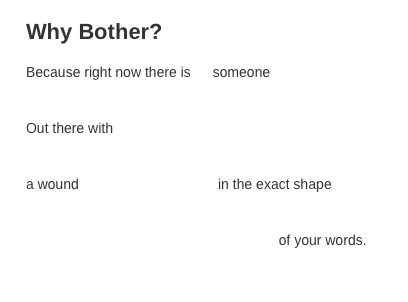3.1 miles
mississippi river road path, north/south
52 degrees
Decided to run again this morning because tomorrow winter returns: ice, snow, blizzard conditions. Hopefully it will melt quickly but if not, at least I was able to run just above the gorge today. It’s sunny and windy. My legs felt sore–not injured sore, just sore sore–and it was hard to just be in the run, not thinking. I tried chanting a little and that helped. Strawberry blueberry raspberry. Haven’t seen the Daily Walker in a while. Enjoyed listening to the grit scratch scratch scratch. Noticed a few stray patches of snow down below the lake street bridge. Marveled at the beauty of the floodplain forest, bare and brown. Didn’t really look at the river. Encountered a few dogs and their owners.
The daily poem over at poems.org is amazing:
Holdfast
Robin Beth Schaer
The dead are for morticians & butchers
to touch. Only a gloved hand. Even my son
will leave a grounded wren or bat alone
like a hot stove. When he spots a monarch
in the driveway he stares. It’s dead,
I say, you can touch it. The opposite rule:
butterflies are too fragile to hold
alive, just the brush of skin could rip
a wing. He skims the orange & black whorls
with only two fingers, the way he learned
to feel the backs of starfish & horseshoe crabs
at the zoo, the way he thinks we touch
all strangers. I was sad to be born, he tells me,
because it means I will die. I once loved someone
I never touched. We played records & drank
coffee from chipped bowls, but didn’t speak
of the days pierced by radiation. A friend
said: Let her pretend. She needs one person
who doesn’t know. If I held her, I would
have left bruises, if I undressed her, I would
have seen scars, so we never touched
& she never had to say she was dying.
We should hold each other more
while we are still alive, even if it hurts.
People really die of loneliness, skin hunger
the doctors call it. In a study on love,
baby monkeys were given a choice
between a wire mother with milk
& a wool mother with none. Like them,
I would choose to starve & hold the soft body.
I think I was that one friend to my mom. We would sit in the two matching chairs in her bedroom, watching bad tv–mostly The Real Housewives of New York–and good tv–the barefoot contessa–and laugh and talk, forgetting about how she was dying from stage four pancreatic cancer.
